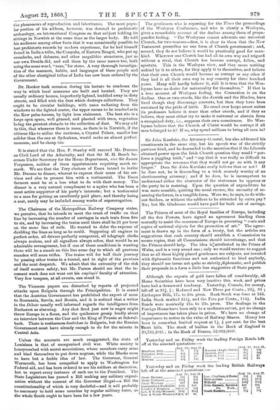The gentleman who is reporting for the Times the proceedings
of the Wesleyan Conference, and who is clearly a Wesleyan, gives a remarkable account of the decline among them of propa- gandist feeling. "The Wesleyans cannot advocate one universal Church, for two reasons—first, it is clear to them that the New Testament prescribes no one form of Church government ; and, second, they do not believe it would be practically good for man- kind. Wherever one Church has had all its own way and reigned without a rival, that Church has become corrupt, fallen, and apostate. This is the 'Wesleyan view, and they mean nothing unkind by it to others, for they apply it to themselves, and believe that their own Church would become as corrupt as any other if they had it all their own way in any country for three hundred years. Many will hardly believe it, still it is true that the Wes- leyans have no desire for universality for themselves." If that is a true account of Wesleyan feeling, the Connexion is on the decline. One or two creeds, like the Jewish and the Hindoo, have lived though they discourage converts, but then they have been sustained by the pride of birth. No creed ever keeps sweet unless its professors believe it truer than other creeds, and if they so believe, they must either try to make it universal or abstain from a recognized duty, i.e., suppress their own consciences. Do Ilres- leyans believe that the Church of Christ would be corrupt if all men belonged to it? If so, why spend millions to bring all men in?






























 Previous page
Previous page